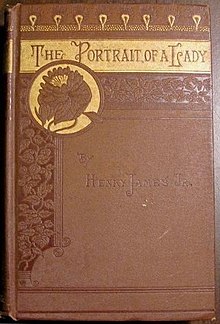The Portrait of a Lady
The Portrait of a Lady is a novel by Henry James. It was published in parts (serialization) in 1880-1881. It was published as a book in the United States by Houghton, Mifflin in 1881.
 American first edition cover | |
| Author | Henry James |
|---|---|
| Country | United States |
| Language | English |
| Genre | Novel |
| Publisher | Houghton, Mifflin and Company (Boston) |
Publication date | 1881 |
| Media type | |
It tells the story of a rich young American woman, Isabel Archer. She is exploited by the scheming Madame Merle and her friend Gilbert Osmond. Isabel weds Osmond and finds herself in a loveless marriage.
The book was a great success. It is thought one of James's finest works. The story has been adapted to a BBC television program and to a movie starring Nicole Kidman.
Plot summary
changeIsabel Archer, from Albany, New York, is invited by her mother's sister, Lydia Touchett, to visit Lydia's rich husband, Mr Touchett, at his house near London, following the death of Isabel's father. There, Isabel meets her uncle, her friendly sick cousin Ralph Touchett, and the Touchetts' neighbor, Lord Warburton.
Isabel later declines Warburton's sudden proposal of marriage. She also rejects Caspar Goodwood, the son and heir of a rich Boston mill owner. Although Isabel likes both Caspar and Lord Warbuton,she likes her independence, which prevents such a marriage, which she feels would sacrifice of her freedom.
The elder Touchett grows ill and, at the request of his son, Ralph, leaves a lot of money to Isabel upon his death. With her large fortune, Isabel travels to Europe and meets an American expatriate, Gilbert Osmond, in Florence. Although Isabel had previously rejected both Warburton and Goodwood, she accepts Osmond's proposal of marriage, unaware that it has been promoted by the accomplished but untrustworthy Madame Merle, another American expatriate, whom Isabel had met at the Touchetts' house.
Isabel and Osmond live in Rome, but their marriage rapidly sours, owing to Osmond's egotism and lack of genuine affection for his wife. Isabel grows fond of Pansy, Osmond's presumed daughter by his first marriage, and wants to grant her wish to marry Edward Rosier, a young art collector.
The snobbish Osmond would prefer that Pansy accept the proposal of Warburton, who had previously proposed to Isabel. Isabel suspects, however, that Warburton may just be faking interest in Pansy to get close to Isabel again, and the conflict creates even more problems within the unhappy marriage.
Isabel then learns that Ralph is dying at his house in England and prepares to go to him for his final hours, but Osmond selfishly opposes this plan. Meanwhile, Isabel learns from her sister-in-law that Pansy is actually the daughter of Madame Merle, who had had an adulterous relationship with Osmond for several years.
Isabel pays a final visit to Pansy, who begs her to return someday, which Isabel reluctantly promises to do. She then leaves, without telling her husband, to comfort the dying Ralph in England, where she remains until his death.
Goodwood encounters her at Ralph's estate and begs her to leave Osmond and come away with him. He passionately embraces and kisses her, but Isabel flees. Goodwood seeks her out the next day but is told she has set off again for Rome.
The ending is ambiguous, and the reader is left to imagine whether Isabel returned to Osmond to suffer out her marriage in noble tragedy (perhaps for Pansy's sake), or if she is going to rescue Pansy and leave Osmond.